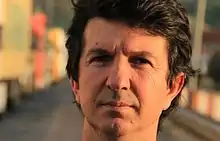Yüksel Yavuz | |
|---|---|
 | |
| Born | 1 February 1964 Karacokan |
| Education | University of Hamburg |
| Occupation | Film Director |
Yüksel Yavuz (born 1 February 1964 in Karakoçan, Turkey) is a Kurdish film director from Turkey.
Early life and education
Since 1980, he has lived in Germany, where he lived with his father[1] who had found work at the port of Hamburg.[2][1] From 1986 to 1989 he studied sociology and economics at the University of Hamburg and from 1992 to 1996 visual communications at the Academy of Fine Arts in Hamburg.[1]
Professional career
His first film from 1995 he produced for the German public broadcaster ZDF[2] and is an autobiographical documentary about the experience of his father as a guest worker and his mother, who stayed behind in the village.[1] Since he has directed several documentaries and feature films.[3] His movies often focus on the Kurdish diaspora and the signification of the homeland for the refugees and immigrants.[3] Longing for Istanbul focuses on the several nationalities that have settled in Istanbul while Hope on the human rights of Kurdish people in Turkey.[4]
He has won a number of awards.[5]
Personal life's involvement in the movies
His father has acted in two of his movies, the autobiographical documentary My Father, the Guestworker and then also in Children of April.[6] Besides a character in the movie Children of April works in a meat factory similar to one, Yavuz himself was working for a while as well.[6] The documentary Close - Up Kurdistan involves places of his childhood in Karaçokan and an interview with a relative.[6]
Filmography
- 1992: Hoch-Zeit[6]
- 1993: Freedom Pension[6]
- 1993: Coromandel[6]
- 1994: 100 und 1 Mark (Hundred and one Mark)[6]
- 1995: Mein Vater, der Gastarbeiter (My Father the Guestworker)[7]
- 1998: Aprilkinder (Children of April)[6]
- 2000: Beyaz mantolu adam (Man with the white coat)[8]
- 2003: Kleine Freiheit (A little bit of freedom)[6]
- 2007: Close up Kurdistan[6]
- 2010: Sehnsucht nach Istanbul (Longing for Istanbul)
- 2013: Hevî (Hope)[9]
References
- 1 2 3 4 Göktürk, Deniz (2004-09-16). "Yüksel Yavuz's Kleine Freiheit / A Little Bit of Freedom". Transit. 1 (1). doi:10.5070/T711009701.
- 1 2 "MEIN VATER, DER GASTARBEITER - Archiv". bi’bak (in German). Retrieved 2021-10-12.
- 1 2 Kraenzle, Christina (2009). "At Home in the New Germany? Local Stories and Global Concerns in Yüksel Yavuz's "Aprilkinder" and "Kleine Freiheit"". The German Quarterly. 82 (1): 93–105. doi:10.1111/j.1756-1183.2009.00040.x. ISSN 0016-8831. JSTOR 27701117 – via JSTOR.
- ↑ Hippen, Wilfried (2014-03-06). "Dokumentation: Die kurdischen Kämpferinnen". Die Tageszeitung (in German). ISSN 0931-9085. Retrieved 2021-10-13.
- ↑ "Yüksel Yavuz - Regisseur | NEWA FILM" (in German). 21 June 2017. Retrieved 2020-03-01.
- 1 2 3 4 5 6 7 8 9 10 Kraenzle, Christina (2009), p.106
- ↑ "Mein Vater, der Gastarbeiter". www.zeroone.de.
- ↑ Almancı. "Beyaz Mantolu Adam / Der Mann mit dem weißen Mantel | GEGEN DIE LEINWÄNDE" (in German). Retrieved 2021-10-12.
- ↑ "Hêvî - Hoffnung | Film 2013 | moviepilot.de". www.moviepilot.de (in German). Retrieved 2019-01-14.